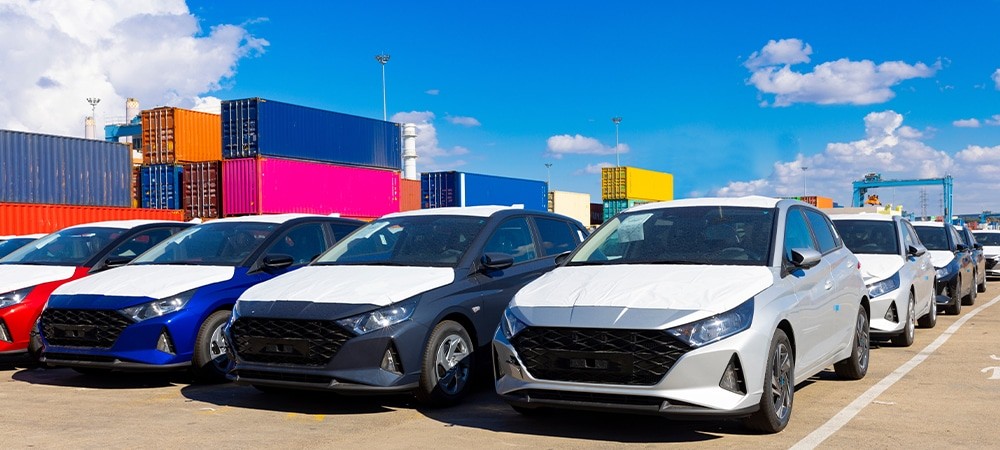Navigating Import Taxes: Understanding the Cost of Bringing Cars into Canada
In international trade, import taxes play a pivotal role in regulating the flow of goods across borders. Understanding the import tax landscape is crucial for those eyeing Canada as a destination to import cars.
From enthusiasts seeking rare models to businesses looking to expand their fleet, comprehending the price of import taxes is essential for informed decision-making. Typically, the cost of import taxes depends on the vehicle type and classification. If the vehicle is used, it may be subject to the applicable provincial or territorial sales tax.
In this blog, we delve into the intricacies of the cost of import taxes on cars in Canada. Here, we discuss how to calculate Canada import duty, offering insights for those venturing into this domain.
Factors that Determine Federal Import Tax on Cars
Import taxes, also known as customs duties, are fees the Canadian government imposes on goods entering the country. These duties are levied based on various factors, including the type of goods, their value, country of origin, and applicable trade agreements.
When importing cars into Canada, several key considerations come into play, shaping the import tax structure. They are,
Type of Vehicle
The cost of import tax on cars in Canada varies depending on whether the vehicle is new or used. New cars are subject to the Goods and Services Tax (GST), currently set at 5% across the country.
In addition to the GST, there may be provincial sales taxes (PST) or harmonized sales taxes (HST) applicable based on the province where you registered the vehicle. On the other hand, used cars are exempt from the GST but may be subject to the applicable provincial or territorial sales tax.
Related Article: Shipping to Canada from Other Countries: What You Need to Know
Country of Origin
Canada has established trade agreements with various countries, influencing the import tax rates on cars from these nations. For example, vehicles imported from countries with which Canada has a free trade agreement, such as the United States, may qualify for preferential tariff rates or exemptions.
Conversely, if you import cars from non-free trade agreement countries, they may face higher import duties.
Vehicle Classification
The classification of the vehicle also affects the import tax calculation. Cars are categorized based on engine displacement, seating capacity, and fuel type. These classifications determine the applicable tariff rates, with certain vehicles subject to higher duties than others.
Age and Condition
The age and condition of the vehicle play a role in determining the pricing for import tax in Canada. While new cars are subject to the GST and potentially other provincial taxes, used cars may be exempt from the GST but subject to provincial sales taxes.
Additionally, the valuation of used cars is based on factors such as mileage, condition, and market value, influencing the overall tax liability.
Calculating Import Taxes
Calculating import taxes on cars in Canada involves several steps, including determining the vehicle’s classification, assessing its value, and applying the relevant tax rates. Importers can use various resources, including online calculators and customs brokers, to estimate the tax liability accurately.
Determine Vehicle Classification
The first step in calculating import taxes is to identify the correct classification of the vehicle. This involves understanding the vehicle’s specifications, such as engine size, seating capacity, and fuel type, to determine its tariff classification.
Assess Vehicle Value
The vehicle’s value serves as the basis for calculating import taxes. For new cars, the value is typically the purchase price you paid to the manufacturer or dealer. The value is determined for used cars based on factors such as mileage, condition, and market value.
Apply Applicable Tax Rates
Once you determine the vehicle’s classification and value, you can apply the relevant tax rates to calculate the import taxes owed. This includes the GST, provincial sales taxes (PST), or harmonized sales taxes (HST) based on the destination province.
Navigating the Import Process
Importing cars into Canada involves navigating a complex process beyond paying import taxes. From complying with regulatory requirements to arranging transportation and customs clearance, importers must follow specific steps to ensure smooth entry for their vehicles.
- Compliance with Regulations: You must comply with various regulatory requirements set forth by the Canada Border Services Agency (CBSA) and other government agencies. This includes providing accurate documentation, such as the bill of sale, certificate of origin, and vehicle registration, to facilitate customs clearance.
- Transportation and Logistics: Arranging transportation for imported vehicles is critical to the import process. You can choose between various shipping methods, including container shipping, roll-on/roll-off (RoRo) transport, or ground transportation for vehicles originating from the United States.
- Customs Clearance: Clearing customs is a crucial step in the import process. It requires importers to submit the necessary documentation and pay the applicable import taxes and duties. Working with a licensed customs broker can streamline the clearance process and ensure compliance with customs regulations.
Related Article: Navigating Global Boundaries: A Budget-Friendly Guide to International Shipping with RoadLINX
Expert Car Importation Service in Ontario
Importing cars into Canada entails navigating a maze of regulations, tariffs, and procedures. Understanding the import tax landscape is essential if you’re seeking to bring vehicles into the country while minimizing costs and ensuring compliance with regulatory requirements.
If you want to bring your cars into Canada without going through the hassles of importation, let RoadLINX handle your importation. With years of experience importing cars into Canada, we can safely deliver your vehicle to you.
Reach out to us today at 905-760-1141 to get a quote.
Sign up for industry alerts, insights & news from RoadLINX


